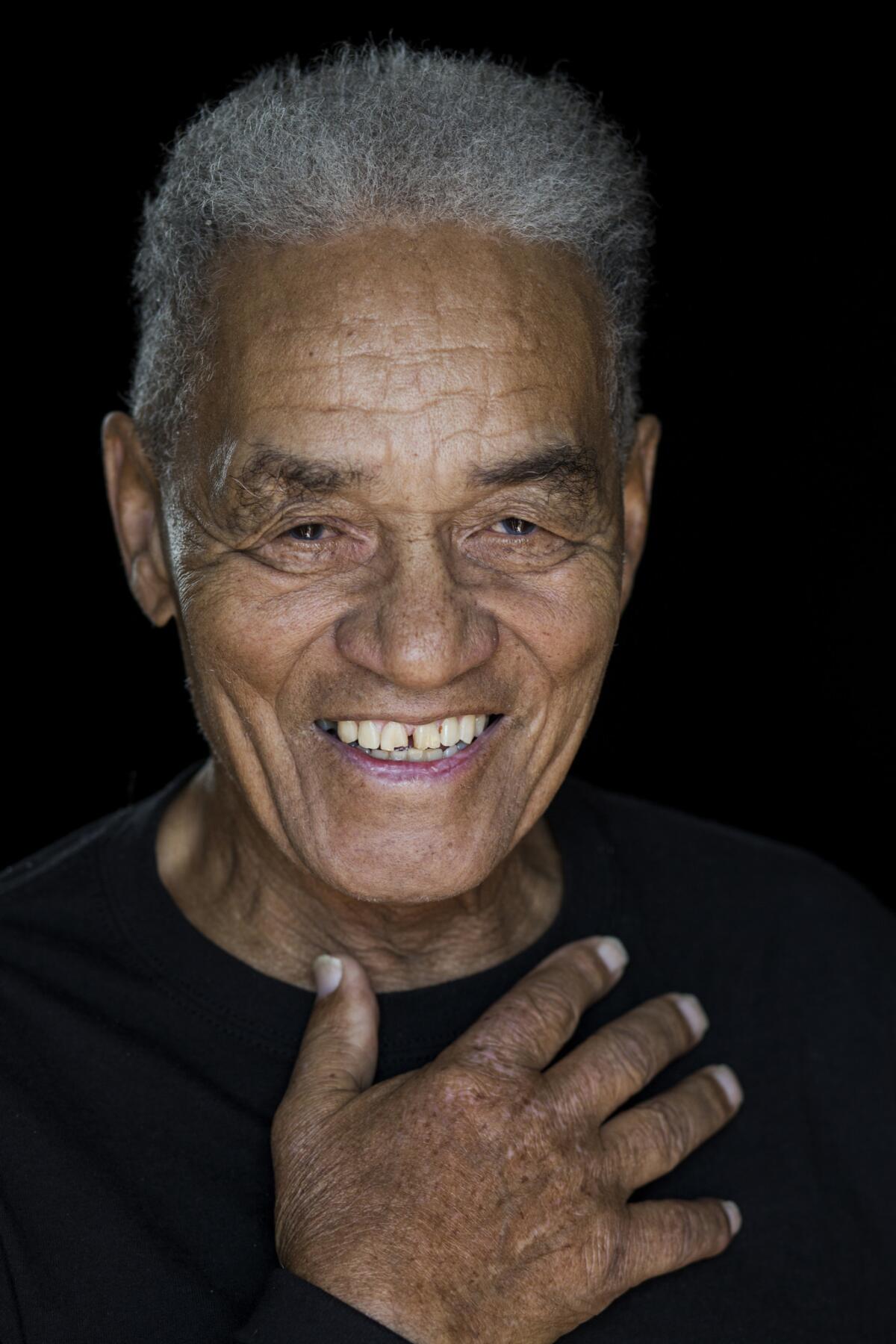Farewell to an Uneasy Rider: Memorial service for Cliff Vaughs
- Share via
White Boy Art was there. So were Halfbreed Tony, Creeper, Dingo and Dr. Feelgood. Along with 40 other members of the Chosen Few motorcycle club, they turned out to honor a fallen brother.
Clifford “Soney” Vaughs, the African American bike builder who designed and helped build the iconic “Captain America” chopper used in the movie “Easy Rider,” died July 2.
At a Sunday gathering at the Deus Ex Machina motorcycle store in Venice, the Chosen Few and members of Vaughs’ family celebrated the life of the charismatic, multi-talented man who, through a faceted career worked as a fashion photographer, news cameraman, civil rights activist, film and TV producer, rock music manager and, almost incidentally, motorcycle designer.
“It was a rich, interesting life — a real American story,” said event emcee Paul D’Orleans, a motorcycle historian who wrote extensively about Vaughs’ contributions to chopper design. “He was the real Captain America.”
Recalling Vaughs’ brash habit of touring the South on a chopper as he tried to help poor sharecroppers register to vote in the early 1960s, D’Orleans said, “He wanted to be a visible symbol of a free, black man.”

For years, Vaughs’ participation in “Easy Rider,” along with Watts bike builder Ben Hardy, was obscured by misinformation put forth by the film’s producers and director.
Despite the fact that Vaughs had helped newcomer filmmakers Dennis Hopper and Peter Fonda buy the motorcycles to use in the film, then oversaw their construction and was hired as associate producer for the 1969 counterculture movie, his name was expunged from the official “Easy Rider” history.
It resurfaced only recently, as motorcycle journalists sought to give Vaughs and Hardy recognition.
“They never got any credit for building the most famous motorcycle in the world,” D’Orleans said.
Hopper died in 2010. Fonda, not able to attend the event, sent a note to be read at the service.
“Cliff and Ben made an icon,” Fonda wrote. Without their help, he added, “I would have been just another biker with a cool paint job on his tank and helmet.”
D’Orleans and the Chosen Few bikers, who rolled to Venice in their bright-red club colors, were joined by Vaughs’ surviving partner, Daniella Sapriel, and several members of Vaughs’ large family. His daughters Rivka and Martica, and sons Milo, Seth and Demian, were moved by the outpouring of support and love for their late father. A fourth son, Sundance, was not able to travel to the ceremony.
Born in 1937 in Boston to a teen mother who worked as a housekeeper and nurse, Vaughs grew up poor but excelled in school, attending Boston Latin School and Boston University.
He said he was a news photographer and an assistant for fashion photographer Richard Avedon, and worked as an organizer for the Student Nonviolent Coordinating Committee. He also served in the Marine Corps.
After the SNCC sent him west to open a Los Angeles chapter, he found work as a TV and radio reporter. He successfully sued to break race barriers in the Hollywood cameramen’s union, and went on to produce the race relations documentary “What Will The Harvest Be?” The now-lost film included interviews with Martin Luther King Jr., Stokely Carmichael, Julian Bond and others.
With Fonda, post-“Easy Rider,” he also produced the motorcycle safety movie, “Not So Easy.” He had a hand in producing several record albums too, during a period in which he managed the rock drummer Buddy Miles.
During that period, he helped open a Hollywood chapter of the L.A.-based Chosen Few, one of the country’s first integrated motorcycle clubs.
Sapriel said it was exposure to violence in the South as a civil rights organizer, and violence in California, where he was beaten up by colleagues angry about his efforts to integrate the cameramen’s union, that caused him to flee the U.S.
Vaughs left California in the early 1970s and spent his next three decades as an expatriate sailor, plying the waters of Central and South America and the Caribbean — often, he said in interviews with The Times, helping to smuggle refugees, drugs, arms and contraband.
That life included stints in jail, drug addiction and homelessness, Vaughs said, and ended when his boat was boarded and confiscated by pirates, who threw him overboard and left him for dead.
“He lived the life of an adventurer,” Sapriel said. “He had every adventure a man could have.”
Despite the recent acclaim he received for his part in “Easy Rider,” including a panel appearance at last year’s Motorcycle Film Festival in New York, Vaughs downplayed the importance of the movie — which he said he’d never seen in its entirety until last year.
“I’m happy about it,” Vaughs said. “But that was just a month out of my life.”




